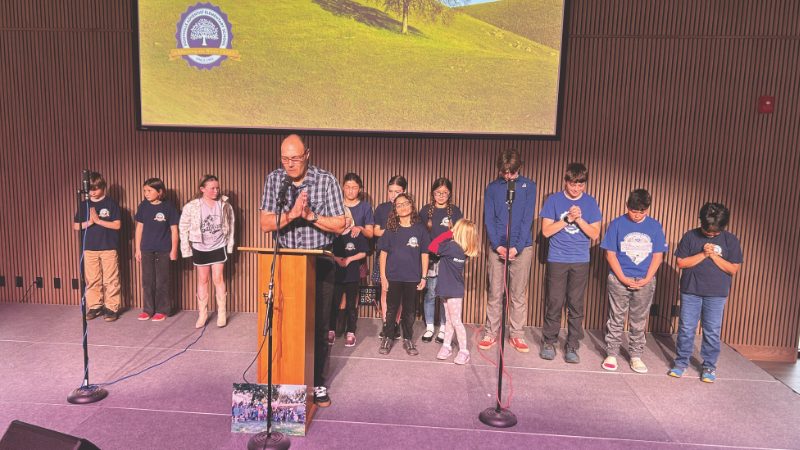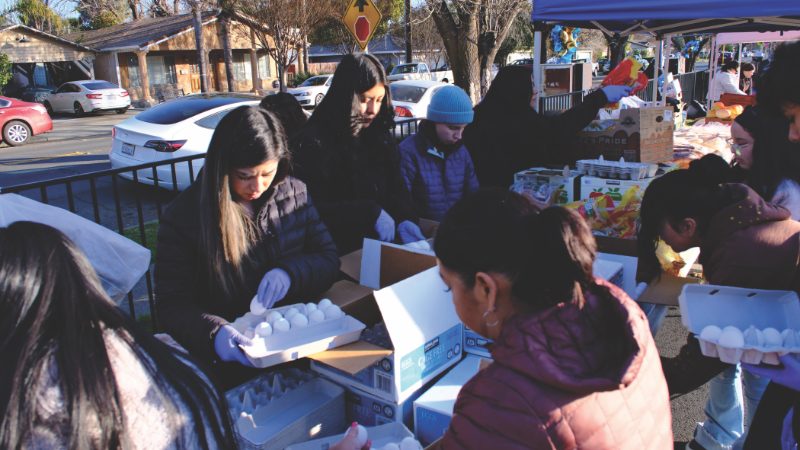Changing Times, Changing Laws

That was then, this is now. Randy Hill, who spent part of 1985 working as a Taskforce youth pastor in the Simi Valley church in California, is now vice president for youth and young adult ministries for the Pacific Union. Hill recently provided an update.
“The term Taskforce is not heard as much anymore,” he said, “and in many parts of the country, this kind of volunteer service is very limited. Human resources laws have changed. A young person cannot just go and live in somebody’s spare bedroom and be provided a minimal stipend. They have to be paid a legal minimum wage. That has made such service cost-prohibitive for work in many local churches. However, possibilities still exist in some places.”
Gladys Guerrero, in the North American Division (NAD) Office of Volunteer Ministries, largely confirmed Hill’s statement about changing human resources laws. However, she said Adventist college students are continuing to serve in parts of North America. Furthermore, under specific circumstances, Taskforce volunteers may legally be considered volunteers rather than employes, in which case a minimum wage may not be a requirement.
Regarding applicable laws, the Associate General Counsel’s office at the General Conference has provided a guidelines checklist. According to the document, definitions are crucial: “The Allowance is not wages or compensation for work done. It is based strictly on need and not based on what the person does, what educational or experience qualifications they have, how many hours they work, or what responsibilities they are given.”
According to Federal Income Tax rules, if housing is provided, a per diem allocation to cover food and incidental expenses should not exceed $64 per day. However, if housing and meals are provided, the maximum allowable per diem allowance, essentially for toiletries and laundry, is $5 per day.
So, human resources laws and IRS regulations are specific—conforming to details is essential—but legal considerations have not entirely suffocated the Taskforce idea in North America. Incidentally, Guerrero said that the NAD Office of Volunteer Ministries continues to use the term “Taskforce” on a regular basis.
An epidemic dividend
Guerrero reported a surprising development related to the covid epidemic. She explained that, before covid, interest in North American service had dwindled, with students at most Adventist colleges gravitating toward overseas service. However, with international travel curtailed during the epidemic, but with desire for service still strong, college students looked again to North American opportunities. The old Taskforce idea, which had languished to some extent, was reinvigorated.
Steven Manoukian is director of student missions for Southern Adventist University (SAU). Manoukian reports that, in the 2023-24 school year, Southern has sent 15 students to Pennsylvania, Idaho, North Carolina, Michigan, Oregon, Hawaii, and Alaska. Their service includes dormitory assistant deans, teachers’ aids, and assistant pastors. One young woman from SAU is working in Nome, Alaska, at a Christian radio station and an interdenominational homeless shelter.
Guerrero’s NAD office keeps track of the numbers. She reports the following Taskforce volunteers during the current school year (see chart above).
In addition, 20 students from colleges and universities other than Adventist institutions have been processed by the NAD Office of Volunteer Ministries for the current school year.

And in Hawaii
One particular conference in the far west of the Pacific Union has quietly moved into the forefront of the resurgence of Taskforce activity, although the actual term “Taskforce” is not always used.
In 2014, Elder Erik VanDenburgh, then the Hawaii Conference youth ministry director, was talking to Jaime Vargas, a theology major at Andrews University. Vargas said to VanDenburgh, “I’m terrified. No one knows me. I don’t know how I’ll get hired as a pastor, and then if I do get hired, I’m terrified because I don’t know how to lead a church.”
Although he didn’t know it at the time of that conversation, Vargas would soon become the first of many Adventist young people to participate in the Hawaii Conference’s Leadership Development Program, which VanDenburgh was instrumental in launching during the autumn of 2014. Now a successful alumnus of the program, Vargas serves as a pastor on the island of Kauai.
In a recent phone conversation, VanDenburgh, who has been Hawaii Conference president since April 2022, explained, “Our church is in need of pastors, and we don’t just need bodies. We need qualified, trained pastors who are able to come in and do the job. This is a reason I chose to come to Hawaii, to help develop this program.”
The program includes opportunities not only for aspiring pastors but also for those with an interest in classroom teaching, camp operations, communication, and treasury.
Hawaii Conference Superintendent of Schools Miki Akeo-Nelson reported in January 2024 that 11 Taskforce volunteers are serving in posts around the conference during the 2023-2024 school year. Since 2014, seventy-nine Taskforce volunteers have served in education positions in the conference.
“The program equips our pastors and teachers with real-life experience,” said President VanDenburgh. “It gives them a perspective of what ministry is really like. It helps them to identify their calling. And it connects them with resources and connections that they didn’t have before. It opens opportunities. It allows them to build a résumé, and it gives them a reference.”
VanDenburgh explained that, in addition to being teamed up with a mentoring pastor, the pastors-in-training are involved in weekly sessions that cover three crucial areas. “We talk about life, about ministry, and about theology,” VanDenburgh said, “so they are mentored in those areas in an intentional way. This has been very beneficial.”
Including eight who are currently involved in a year of volunteer service, VanDenburgh said that, since 2014, fifty-one young people have served a year in the volunteer Leadership Development Program.
Three pastors currently serving in the Hawaii Conference came through the program. Another is currently enrolled in the seminary at Andrews, sponsored by the Hawaii Conference, and yet another has recently accepted a call to work with Hope Channel International in Silver Spring, Maryland. VanDenburgh estimates that at least half of those who have come through the program are working for the church in some capacity, in Hawaii or other conferences.
We talk about life, about ministry, and about theology, so they are mentored in those areas in an intentional way. This has been very beneficial.


Reminiscing

A few months ago, I was talking on the phone with my old friend Bob Tetz, who was the British Columbia youth director 50 years ago. He has since passed away. Bob and I talked about his involvement in getting the Taskforce program started. During our long and delightful time of reminiscing, Bob said, “I don’t know what I would have done without you guys. Having been a church pastor, I entered the Conference Youth Department as a complete novice. The Taskforce volunteers had a great part in gaining the interest of young people in the conference. I don’t know that my ministry could have succeeded without you.”
And it is fair to say that a significant group of us don’t know that our work in the Adventist Church would have succeeded apart from those formative years as Taskforce volunteers that began our ministries.
_____________________________
Bert Williams, who is now retired, served the Adventist Church in Canada, East Africa, and several regions of the United States. He worked, at various times, as a church pastor, academy teacher, and editor. He and his wife live in San Mateo and are members of the Palo Alto church.
Una idea a la que le había llegado su hora— 3ª PARTE
Tiempos cambiantes, leyes cambiantes
Por Bert Williams

Eso era antes, ahora no. Randy Hill, quien pasó parte de 1985 trabajando como pastor de jóvenes como Taskforce en la iglesia Simi Valley en California, es ahora vicepresidente de ministerio de jóvenes y adultos jóvenes de la Pacific Union. Hill proporcionó recientemente una actualización.
«El término Taskforce ya no se escucha tanto», dijo, «y en muchas partes del país, ese tipo de servicio voluntario es muy limitado. Las leyes de recursos humanos han cambiado. Un joven no puede simplemente ir a vivir a una habitación de otra persona y recibir un estipendio mínimo. Se les tiene que pagar legalmente un salario mínimo. Eso ha hecho que el costo de ese servicio sea prohibitivo para el trabajo en muchas iglesias. Sin embargo, todavía existen posibilidades en algunos lugares».
Gladys Guerrero, de la oficina de Volunteer Ministries de la División Norteamericana (NAD), confirmó en gran medida la declaración de Hill sobre el cambio de las leyes de recursos humanos. Sin embargo, dijo que estudiantes universitarios adventistas continúan sirviendo en partes de Norteamerica. Además, en circunstancias específicas, los voluntarios de Taskforce pueden ser considerados legalmente voluntarios en lugar de empleados, en cuyo caso un salario mínimo puede no ser un requisito.
Con respecto a las leyes aplicables, la oficina del Asesor Jurídico de la Conferencia General ha proporcionado una lista de verificación de pautas. De acuerdo con el documento las definiciones son cruciales: «El subsidio no es un salario o compensación por el trabajo realizado. Se basa estrictamente en la necesidad y no en lo que hace la persona, qué cualificaciones educativas o de experiencia tiene, cuántas horas trabaja o qué responsabilidades se le asignan».
De acuerdo con las reglas del Impuesto Federal sobre la Renta, si se proporciona vivienda, una asignación diaria para cubrir los gastos de alimentos e imprevistos no debe exceder los $64 por día. Sin embargo, si se proporciona alojamiento y comidas, la asignación diaria máxima permitida, esencialmente para artículos de tocador y lavandería, es de $5 por día.
Por lo tanto —las leyes de recursos humanos y las regulaciones del IRS son específicas— es esencial ajustarse a los detalles, pero las consideraciones legales no han sofocado por completo el concepto de Taskforce en Norteamérica. A propósito, Guerrero dijo que la oficina de Volunteer Ministries de la División Norteamericana continúa usando el término «Taskforce» de manera regular.
Un dividendo epidémico
Guerrero informó de un desarrollo sorprendente relacionado con la epidemia de covid. Explicó que, antes del covid, el interés en el servicio de voluntarios en Norteamérica había disminuido, y que los estudiantes de la mayoría de las universidades adventistas gravitaban hacia el servicio en el extranjero. Sin embargo, con los viajes internacionales restringidos durante la epidemia, pero con el deseo de servicio aún firme, los estudiantes universitarios volvieron a buscar oportunidades en Norteamérica. El viejo concepto de Tasforce, que había languidecido hasta cierto punto, se revitalizó.
Steven Manoukian es director de misiones estudiantiles de Southern Adventist University (SAU). Manoukian informa que, en el año escolar 2023-24, Southern ha enviado a 15 estudiantes a Pensilvania, Idaho, Carolina del Norte, Michigan, Oregon, Hawaii y Alaska. Su servicio incluye fungir como preceptores asistentes de dormitorios, ayudantes de maestros y pastores asistentes. Una joven de SAU está trabajando en Nome, Alaska, en una estación de radio cristiana y en un refugio interdenominacional para personas sin hogar.
En la oficina de NAD, Guerrero lleva un registro de los números. Ella informa de los siguientes voluntarios de Taskforce durante el año escolar en curso (ver tabla arriba).
Además, 20 estudiantes de colleges y universidades que no son instituciones adventistas han sido procesados por la oficina de Volunteer Ministries de la División Norteamericana para el año escolar en curso.

Y en Hawaii
Una conferencia en particular en el extremo occidental de la Pacific Union ha avanzado silenciosamente a la vanguardia del resurgimiento de las actividades de Taskforce, aunque el término «Taskforce» no siempre es utilizado.
En 2014, el pastor Erik VanDenburgh, quien era director jóvenes de la Hawaii, estaba hablando con Jaime Vargas, un estudiante de teología en Andrews University. Vargas le dijo a VanDenburgh: «Estoy aterrorizado. Nadie me conoce. No sé cómo me contratarán como pastor y, luego, si me contratan, estoy aterrorizado porque no sé cómo dirigir una iglesia».
Aunque no lo sabía en el momento de esa conversación, Vargas pronto se convertiría en el primero de muchos jóvenes adventistas en participar en el Programa de Desarrollo de Liderazgo de la Hawaii Conference, en el que VanDenburgh jugó un papel decisivo en su lanzamiento durante el otoño de 2014. Vargas, que ahora es un exitoso exalumno del programa, sirve como pastor en la isla de Kauai.
En una conversación telefónica reciente, VanDenburgh, quien ha sido presidente de Hawaii Conference desde abril de 2022, explicó: «Nuestra iglesia necesita pastores y no solo necesitamos cuerpos. Necesitamos pastores cualificados y capacitados que sean capaces de venir y trabajar. Esa es una de las razones por las que elegí venir a Hawaii, para ayudar a desarrollar ese programa».
El programa incluye oportunidades no solo para aspirantes a pastores, sino también para aquellos interesados en la enseñanza, las operaciones del campamento, comunicación y tesorería.
La superintendente de escuelas de Hawaii Conference, Miki Akeo-Nelson, informó en enero de 2024 que 11 voluntarios de Taskforce están sirviendo en puestos alrededor de la conferencia durante el año escolar 2023-2024. Desde 2014, setenta y nueve voluntarios de Taskforce han servido en puestos de educación en la conferencia.
«El programa equipa a nuestros pastores y maestros con experiencias de la vida real», dijo VanDenburgh. «Les da una perspectiva de cómo es realmente el ministerio. Les ayuda a identificar su vocación. Y los conecta con recursos y conexiones que antes no tenían. Abre oportunidades. Les permite construir un currículum y les provee una referencia».
VanDenburgh explicó que, además de estar en equipo con un pastor mentor, los pastores en entrenamiento participan en sesiones semanales que cubren tres áreas cruciales. «Hablamos de la vida, del ministerio y de teología», dijo VanDenburgh, «para que sean asesorados en esas áreas de una manera intencional. Eso ha sido muy beneficioso».
Incluyendo a ocho que actualmente están involucrados en un año de servicio voluntario, VanDenburgh dijo que, desde 2014, cincuenta y un jóvenes han servido un año en el Programa de Desarrollo de Liderazgo voluntario.
Tres pastores que actualmente sirven en la Hawaii Conference pasaron por el programa. Otro está actualmente inscrito en el seminario de Andrews, patrocinado por la Hawaii Conference, y otro ha aceptado recientemente un llamado para trabajar en Hope Channel International en Silver Spring, Maryland. VanDenburgh estima que al menos la mitad de los que han pasado por el programa están trabajando para la iglesia de alguna manera, en Hawaii o en otras conferencias.
«Hablamos de la vida, del ministerio y de teología, para que sean asesorados en esas áreas de una manera intencional. Eso ha sido muy beneficioso».


Recordando

Hace unos meses, estaba hablando por teléfono con mi viejo amigo Bob Tetz, quien fue el director de jóvenes en British Columbia hace 50 años. Bob ya pasó a descansar en el Señor. En esa ocasión Bob y yo hablamos sobre su participación en el inicio del programa Taskforce. Durante nuestra larga y provechosa charla de remembranzas, Bob me dijo: «No sé qué hubiese hecho sin ustedes. Habiendo sido pastor de una iglesia, entré en el departamento de jóvenes de la conferencia como un completo novato. Los voluntarios de Taskforce desempeñaron un papel importante en el interés por los jóvenes en la conferencia. No sé si mi ministerio pudiese haber tenido éxito sin ustedes».
Y es justo decir que un grupo significativo de nosotros no sabemos si nuestro trabajo en la Iglesia Adventista hubiese tenido éxito si no fuese por esos años de formación como voluntarios de Taskforce en el que comenzó nuestro ministerio.
_____________________________
Bert Williams, quien ahora está jubilado, sirvió a la Iglesia Adventista en Canadá, África Oriental y varias regiones de los Estados Unidos. Trabajó, en varias ocasiones, como pastor de iglesia, profesor de academia y editor. Él y su esposa viven en San Mateo y son miembros de la iglesia de Palo Alto.





